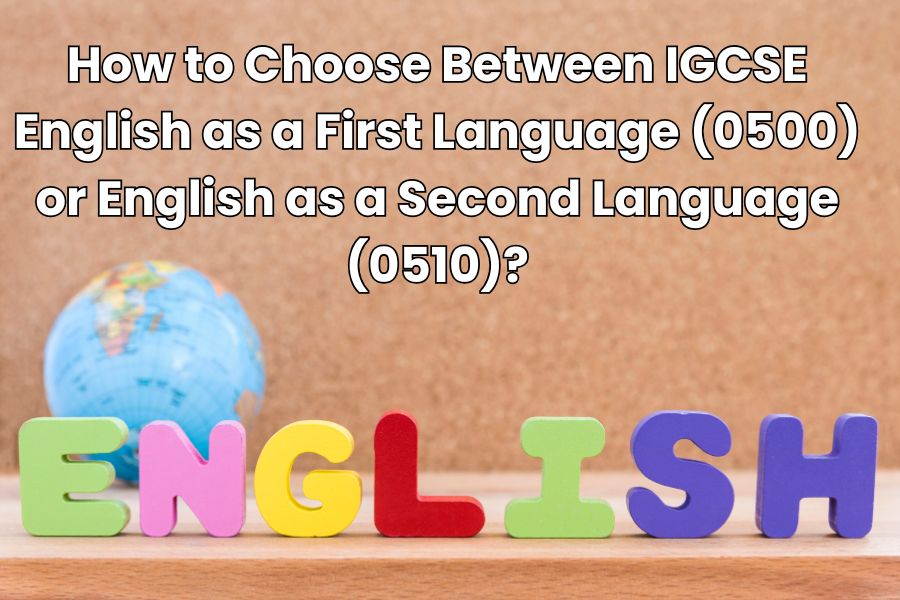How to Choose Between IGCSE English as a First Language (0500) or English as a Second Language (0510)?
The International General Certificate of Secondary Education (IGCSE) offers two primary English language options: English as a First Language (0500) and English as a Second Language (0510). These courses cater to students with varying levels of English proficiency, making it crucial to choose the right one to ensure academic success and confidence.
This article explores the importance of choosing the right course, the key differences between them, and the factors to consider when making your decision.
Why is Choosing the Right IGCSE English Course Important?
Tailored Learning Experience:
Selecting the right course ensures the curriculum matches your current language skills, providing a balance between challenge and manageability.
Confidence Building:
A course that aligns with your abilities can boost your confidence, making the learning process enjoyable and less stressful.
Academic Performance:
Choosing a course that suits your proficiency level helps you achieve better grades, which are vital for university applications and career opportunities.
Future Readiness:
Whether you need advanced academic English or practical communication skills, the right course prepares you for your future goals, be it higher education or professional pursuits.
Language Foundation:
Both courses strengthen your English language foundation, a critical skill for navigating today’s globalized world.
What is IGCSE English as a First Language (0500)?
IGCSE English as a First Language is designed for students who have a high level of fluency in English. The course challenges learners to explore complex texts and develop advanced writing and analytical skills.
Key Features:
- Detailed analysis of literature and non-fiction texts.
- Creative and critical writing tasks, including essays, articles, and narratives.
- A high focus on grammar, punctuation, and vocabulary precision.
- Stricter grading standards, reflecting near-native proficiency.
Who is it for?
- Native English speakers or students with extensive exposure to English.
- Individuals aiming for careers requiring advanced communication, such as law, media, or academia.
The Importance of IGCSE English as a First Language
IGCSE English as a First Language (0500) plays a vital role for students with advanced English proficiency. Its significance extends beyond academics, offering long-term benefits for personal, professional, and intellectual growth.
Mastering Advanced Communication Skills
The course refines students’ ability to articulate complex ideas with clarity and precision. This is crucial in academic essays, professional correspondence, and public speaking. Advanced grammar and nuanced vocabulary help convey meaning effectively in diverse settings.
Critical Thinking and Analysis
Students analyse intricate texts, identifying themes, biases, and rhetorical techniques. This sharpens their critical thinking abilities, which are indispensable for problem-solving, research, and higher education.
Creative Expression
By engaging in narrative, descriptive, and argumentative writing, students cultivate creativity and the ability to express emotions, ideas, and stories in compelling ways. This is particularly beneficial for careers in literature, media, and arts.
Global Competence
As English is a global lingua franca, mastering it at an advanced level positions students to thrive in international environments, be it in academics, business, or travel.
Foundation for Academic Success
Many top universities value proficiency in advanced English. The skills developed in this course enable students to excel in entrance exams, essays, and presentations, giving them a competitive edge in admissions.
What is IGCSE English as a Second Language (0510)?
IGCSE English as a Second Language is designed for non-native speakers who are still building their English proficiency. The course emphasizes practical communication skills applicable to everyday life and future academic or professional settings.
Key Features:
- Focus on reading comprehension, writing clarity, and listening skills.
- Practical exercises like reports, summaries, and dialogues.
- Speaking assessments to improve verbal communication.
- Flexibility in language expression with lenient grading criteria.
Who is it for?
- Non-native English speakers with basic to intermediate proficiency.
- Students seeking to strengthen their English skills without advanced complexity.
The Importance of IGCSE English as a Second Language
IGCSE English as a Second Language (0510) holds immense importance for non-native English speakers, providing a pathway to gain fluency in practical communication while building a strong foundation for future opportunities.
Building Language Confidence
For students less fluent in English, this course provides a structured and supportive framework to develop core skills: reading, writing, listening, and speaking. The gradual learning curve ensures they gain confidence in using English in real-life situations.
Focus on Practical Communication
Unlike the First Language course, this program emphasizes communication needed for daily interactions, such as drafting emails, making presentations, or participating in discussions. These practical skills are essential for navigating multicultural academic and professional settings.
Bridging the Language Gap
The course is a stepping stone for students transitioning from a native language to English. It enables them to integrate into English-medium institutions or workplaces effectively.
Improved Career Prospects
English proficiency is a highly sought-after skill in global job markets. Completing this course equips students with the language tools needed to excel in industries like hospitality, customer service, IT, and more.
Enhancing Multilingual Skills
For bilingual or multilingual students, mastering English as a second language broadens their linguistic repertoire, fostering cognitive flexibility and global cultural understanding.
What are the Differences between IGCSE English as First Language 0500 and English as Second Language 0510?
| Aspect | English as a First Language (0500) | English as a Second Language (0510) |
| Focus | Advanced communication and critical analysis | Practical communication and foundational skills |
| Assessment Style | Essay writing and text analysis | Listening, reading, writing, and speaking |
| Grading Criteria | Strict; native-level fluency expected | Lenient; accommodates language learners |
| Listening/Speaking | Optional components | Compulsory components |
Choose Between IGCSE English as a First Language or English as a Second Language (ESL)
Choosing between IGCSE English as a First Language (0500) and English as a Second Language (0510) depends on your proficiency, academic goals, and future aspirations. The decision can significantly impact your learning experience and overall performance in the IGCSE examinations. Here’s how you can make the right choice:
Assess Your Current English Proficiency
If you are fluent or have near-native command over English, First Language English may be the better fit, as it focuses on advanced skills like critical thinking, text analysis, and creative writing.
If your English proficiency is still developing or English is not your primary language, opt for a Second Language English to build a solid foundation without the added pressure of complex assessments.
Evaluate Your Academic Goals
For students aspiring to study at universities where English is the medium of instruction, First Language English may provide an advantage due to its rigorous academic preparation.
However, Second Language English also meets the requirements of many institutions and is a more manageable option if you are already balancing a heavy workload.
Consider Your Career Aspirations
Careers in fields like law, journalism, or literature benefit from the advanced communication and analytical skills taught in First Language English.
For roles that require practical communication in multinational environments, Second Language English offers the necessary skills.
Factor in the Curriculum Demands
First-language English has a higher level of complexity, requiring strong reading and writing abilities, while second-language English includes listening and speaking assessments, making it more versatile for everyday communication.
Seek Guidance
Discuss your options with teachers, mentors, or language experts who understand your abilities and potential. Their insights can help you make an informed decision tailored to your strengths and goals.
By carefully evaluating these factors, you can select the course that aligns best with your needs, ensuring a fulfilling and successful learning journey.
Benefits of Both Courses
- First Language English (0500):
Develops a nuanced understanding of language, creativity, and critical thinking, which are essential for advanced academic pursuits and professional excellence. - Second Language English (0510):
Builds a solid foundation in English, focusing on communication and practical skills, ideal for students entering a multicultural academic or professional environment.
Conclusion
At CKM Academy, we understand that choosing between IGCSE English as a First Language or English as a Second Language is a pivotal decision that shapes your academic journey and boosts your confidence. Each course offers distinct advantages, tailored to different levels of proficiency and future aspirations.
Our experienced faculty is here to help you evaluate your language skills, academic goals, and career ambitions to make an informed decision that aligns with your aspirations. Whether you aim to achieve academic excellence or master practical communication skills, our comprehensive coaching, alongside access to meticulously curated past papers and notes, equips you with the tools to excel and thrive in today’s interconnected world. At CKM Academy, your success is our mission.
Image Reference: Freepik
Disclaimer: All trademarks, logos, and brand names are the property of their respective owners. All company, product, and service names used in this website are for identification purposes only. Use of these names, trademarks, and brands does not imply endorsement.







